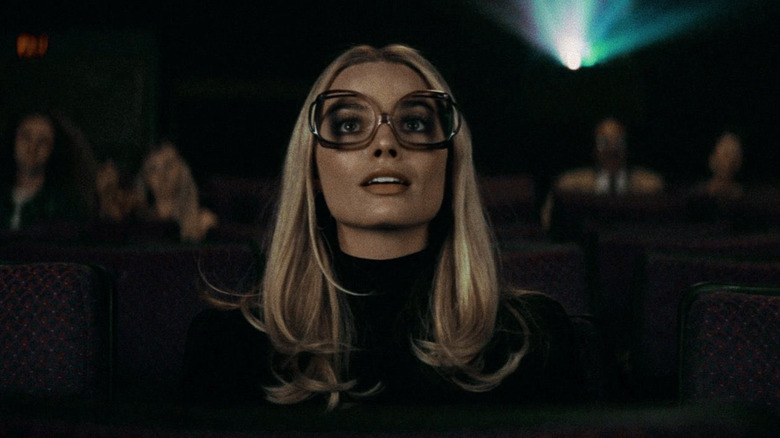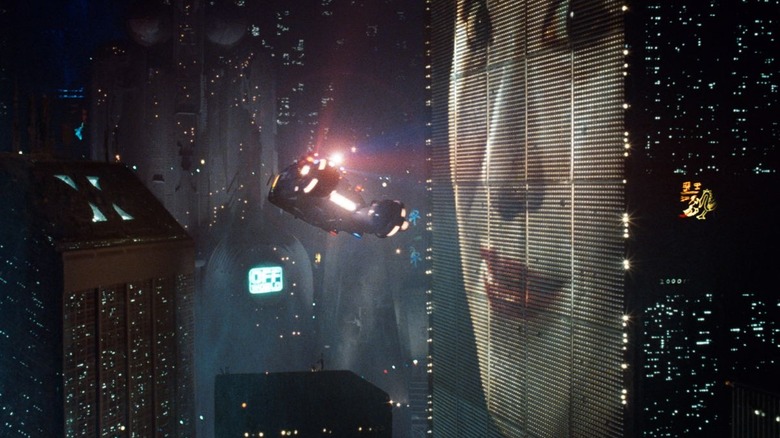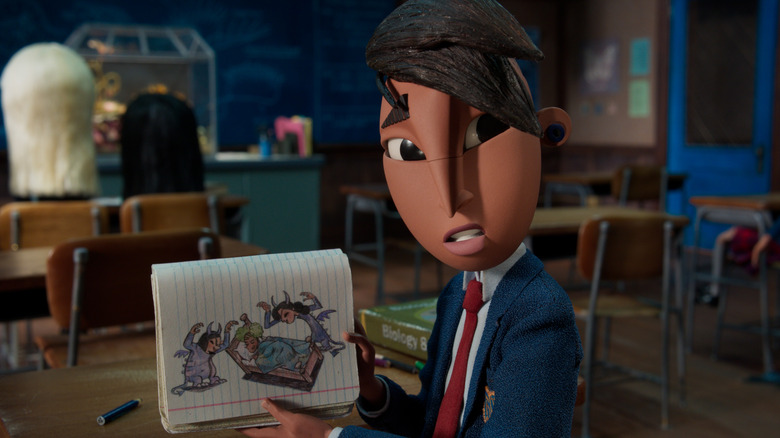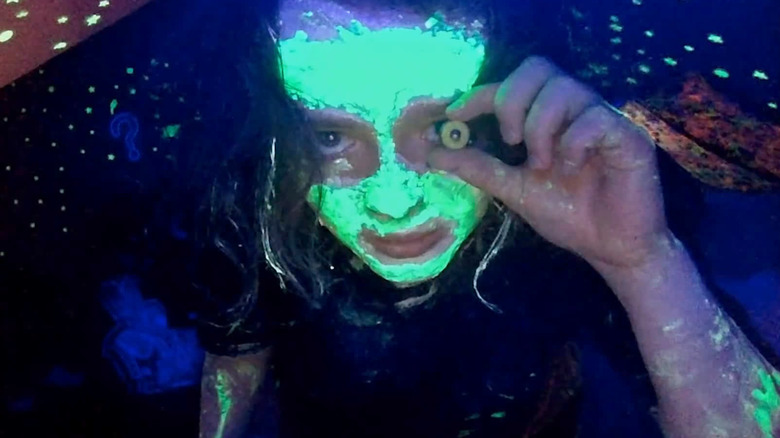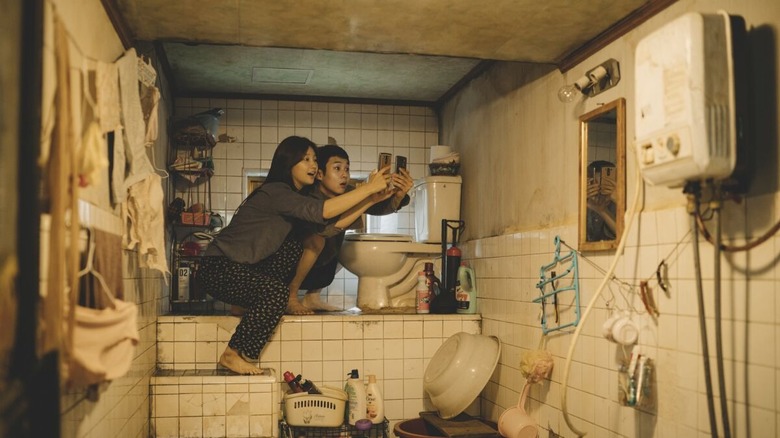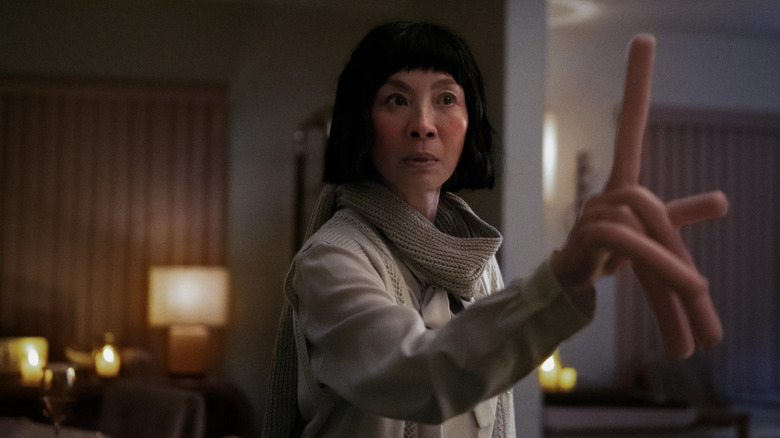Quentin Tarantino Considers Our Era To Be One Of The Worst In Film History
Esteemed writer and director Quentin Tarantino is pretty frank about his opinions, and on a recent episode of his podcast with Roger Avary, "The Video Archives Podcast," he had some harsh words for the current state of movies. The director, whose work is heavily inspired by the cinema of the 1960s and '70s, said that the current era is "the worst in Hollywood history." He was also less than keen on the films of the 1950s and 1980s, saying that they were on par with our contemporary cinematic offerings.
Tarantino has been vocal about his disdain for the Marvel Cinematic Universe and other big tentpole franchise films, telling The L.A. Times that he would never direct that kind of film because he's not a director-for-hire. While he's an incredible writer and director who has made some truly brilliant films, he's also totally wrong. There are obviously major problems plaguing the film industry and the relative disappearance of the mid-budget movie in service of big blockbusters is an issue, but there is a bounty of fantastic filmmaking to be found. Movies can be made by just about anyone with a vision, and as long as you have an internet connection, you have access to more titles than any brick-and-mortar could ever hold. The state of movies in the 2020s isn't "the worst in Hollywood history" — it's just different.
Fantastic films from every decade
On the podcast, Tarantino was harsh on modern Hollywood, comparing it to two previous eras:
"Even though the '80s was the time that I probably saw more movies in my life than ever -– at least as far as going out to the movies was concerned -– I do feel that '80s cinema is, along with the '50s, the worst era in Hollywood history. Matched only by now, matched only by the current era!"
If we're looking exclusively at studio films that are a part of the old school Hollywood machine, Tarantino might have a point. The big studios take fewer chances and use franchise formulas to ensure fans buy tickets and merchandise. What he's not mentioning are the incredible influx of independent films from more diverse voices than we've ever seen before, or the fact that foreign films have become infinitely more accessible because of the Internet.
Looking beyond the big studio hits, though, there are massively important films from both eras. How can you call the 1950s bad when there are films like "Night of the Hunter," "A Streetcar Named Desire," and "12 Angry Men?" The 1980s featured an insane explosion of genre cinema and gave us "Blade Runner," "The Evil Dead," and "Little Shop of Horrors." There is good in every era, and Tarantino is unfortunately overlooking the magic of contemporary cinema.
More, more, more
When people bemoan the "current state of cinema," they almost always bring up big-budget blockbuster tentpole features that didn't click with them, like the "Jurassic World" movies or some kind of superhero flick, but they seem to completely gloss over just about every other kind of feature film out there. Some of these movies never make it to the movie theater, but they're still fantastic flicks in their own right that deserve love. Streaming services are more likely to take swings on more unique and diverse films, and as a result, there is a glut of great stuff out there that could never have existed in the traditional studio system.
It's hard to imagine the Henry Selick film "Wendell and Wild" getting funded and released in the time before streaming. It's the kind of movie that's seen as a risk for theaters because it features a young woman of color as the protagonist and has an extremely diverse cast, which seems to scare executives for some reason. It's also one of my favorite movies of the year, and its portrayal of a young trans character named Raúl felt like a breath of fresh air after years of queerbaiting from Disney and other family-focused studios. There's just so much out there that perhaps it's hard for people to find the gems — but that doesn't mean there are fewer great films, or that they're worth any less than the great films of the past.
Microbudget miracles find their audiences
Another thing that many people fail to mention when discussing the state of cinema today is truly independent cinema. Tarantino was a part of the big wave of independent filmmakers of the 1990s, so it's surprising that he's not stoked about how much more access there is for people to make movies and get them out into the world today. DIY-filmmaking is more alive than ever, and some films with almost non-existent budgets have managed to make big waves when they would have only maybe played a festival or two in the pre-internet days. Jane Schoenbrun's terrifying teenage tale "We're All Going to the World's Fair" is a truly shocking piece of cinema that uses its found footage-style shooting to great effect, while "Tangerine," shot entirely on an iPhone and telling a story about transgender sex workers, rocked Sundance within the past decade.
There are so many incredible independent films available to people with Internet access that a person could theoretically avoid theatrical releases entirely and still see a wide variety of great movies from more diverse voices than ever before. Digital technology has made it easier than ever to make a movie, and the Internet has made it possible to get that movie in front of millions of eyes. So yeah, the studio system is a mess and the franchise stranglehold over the cineplex is occasionally annoying, but audiences and filmmakers both benefit from the Internet leveling the playing field a bit for independent creators. That alone is worth celebrating, and that's without looking at global contributions to film that have become easier to access than ever before.
International cinema for everyone
On top of being a great equalizer for independent filmmakers, the Internet has helped international cinema find audiences that previously would have struggled to see these films. Tarantino was heavily influenced by the cinema of Hong Kong and Japan, and likely had to get expensive imports or bootlegs if he wanted to access those films. Sure, you could go to an art theater and see some of the greatest in international cinema, but not everyone lives within range of an arthouse theater. As a teenager obsessed with international horror in the early 2000s, I remember hunting down bootlegs of "Battle Royale" and carpooling for hours to go see anything that wasn't a big blockbuster. Now, international film has found new audiences through streaming and online rentals. Sure, Bong Joon-Ho's Academy Award-winning "Parasite" did pretty well at the box office, but it got even more attention once it was streaming and everyone could check it out. People who might not go to the theater to see something outside of their comfort zone are more likely to give it a shot from their couch. After all, if you don't like the movie, you can just put on something else.
Streaming allows everyone to take risks, from the executives who sign on to produce a movie to the audiences at home who decide to hit play on something a little different. It's leading to more people discovering more kinds of movies, and in the end, it's actually good for art. Instead of being forced to special order imports of films like "Portrait of a Lady on Fire" or "Benedetta," I can watch them on streaming first before dropping serious cash on a Blu-ray, and that rules.
Too much good to ignore
Regardless of where you land on big-budget blockbusters like "Jurassic World" or the latest MCU feature, it's impossible to deny that there is still a lot of great filmmaking happening these days. How can you look at a cinematic landscape that led to "Everything Everywhere All at Once" and possibly say that it's a bad time for movies? For every big-budget blockbuster about caped comic book characters, there are dozens and dozens of other films being made that are worthy of love and attention. Superhero movies and big action blockbusters aren't going anywhere anytime soon because they have an audience, and if hardcore cinephiles want something that fits more to their taste, that's also out there! Sometimes it feels as if the only focus is on what's popular, and that's a pretty limiting view to have.
There are absolutely serious problems facing the world of movie-making today, including the MPA's stranglehold over theatrical releases, problems with getting people back in theaters after the pandemic, and more, but the movie business has always had its issues. This tendency to be cynical about blockbusters has existed for as long as I can remember, and while our current theatrical landscape seems overloaded with them, there are loads of other kinds of movies to be found elsewhere.
I understand the nostalgia for other times and many people's frustration with what's popular right now, but the future of filmmaking is ridiculously bright with more opportunities for filmmakers and audiences alike. What's so bad about that?
